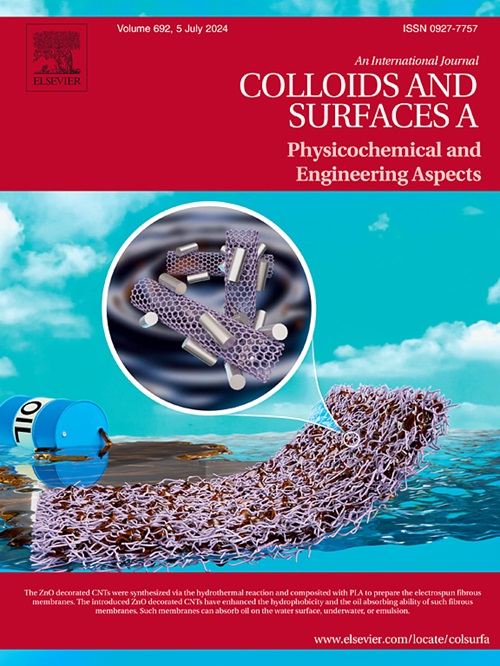湿滑表面上的液滴行为取决于基底粘度
IF 5.4
2区 化学
Q2 CHEMISTRY, PHYSICAL
Colloids and Surfaces A: Physicochemical and Engineering Aspects
Pub Date : 2024-11-21
DOI:10.1016/j.colsurfa.2024.135811
引用次数: 0
摘要
液滴与具有滑动特性的表面的相互作用不仅是一种有趣的自然现象,而且在多个领域都有应用。与常用的液体注入表面的防滑表面制造方法不同,本文采用聚二甲基硅氧烷和硅油两种成分按 1:4 的比例混合制成防滑表面。研究发现,混合物中硅油的粘度对咖啡环效应的抑制和与滑动角度相关的速度行为有深远影响。对制作的光滑表面进行的液滴冲击研究表明,基质中硅油的粘度对表面上的液滴动力学,无论是摆动还是部分反弹,都起着重要作用。此外,还可以通过改变韦伯数来控制部分反弹过程中液滴分裂的尺寸。目前这种通过改变粘度来创建滑溜表面并控制其表面液滴动力学的方法可应用于从开放式微流体到医疗设备等众多领域。本文章由计算机程序翻译,如有差异,请以英文原文为准。
Substrate viscosity-dependent droplet behavior on slippery surface
The interaction of droplets with surfaces that exhibit slippery behavior is not only an interesting natural phenomenon but also finds applications in diverse areas. Contrary to the commonly used liquid-infused surface for slippery surface fabrication, in this paper, a slippery surface is made by mixing the two components of polydimethylsiloxane and silicone oil in a ratio of 1:4. The study reveals the viscosity of the silicone oil in the mixture is found to have a profound effect on the suppression of the coffee-ring effect and sliding angle dependent velocity behavior. The droplet impact studies on the fabricated slippery surface illustrate that the viscosity of the silicone oil in the matrix plays an important role in the droplet dynamics on the surface, whether it is oscillation or partial rebound. In addition, the dimension of the droplet splitting during the partial rebound regime can be controlled by varying the Weber number. The present approach of creating slippery surfaces and controlling the droplet dynamics on its surface by varying the viscosity can find a plethora of applications, ranging from open microfluidics to medical devices.
求助全文
通过发布文献求助,成功后即可免费获取论文全文。
去求助
来源期刊
CiteScore
8.70
自引率
9.60%
发文量
2421
审稿时长
56 days
期刊介绍:
Colloids and Surfaces A: Physicochemical and Engineering Aspects is an international journal devoted to the science underlying applications of colloids and interfacial phenomena.
The journal aims at publishing high quality research papers featuring new materials or new insights into the role of colloid and interface science in (for example) food, energy, minerals processing, pharmaceuticals or the environment.

 求助内容:
求助内容: 应助结果提醒方式:
应助结果提醒方式:


